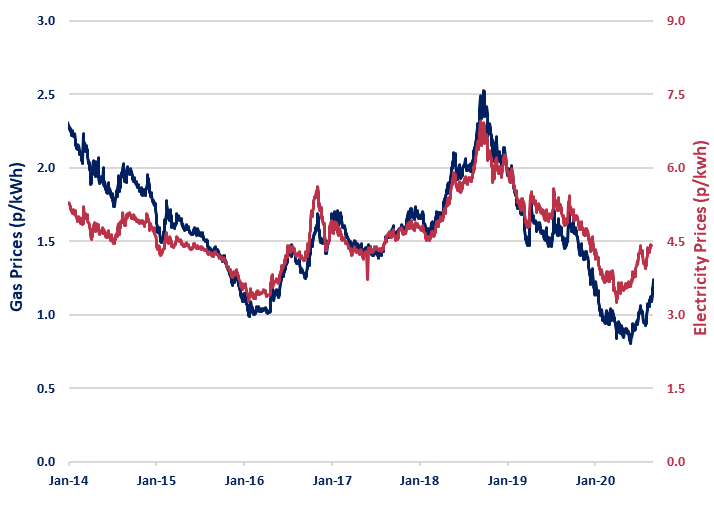UK gas and power prices posted significant gains during August. Gas prices jumped 19.3% to 1.16 p/kWh reflecting falling temperatures and increased demand for power production following several French nuclear outages. Stable pipeline flows, LNG deliveries and gas storage injections largely supplemented the gas system. However, the increase in gas demand saw prices hit their highest point since December 2019.
Power also climbed last month, increasing 12.5% to 4.62 p/kWh, following unplanned French nuclear outages and a surge in carbon prices. Fears over the potential hit to demand of a second wave of Covid-19 across Europe also seem to have somewhat subsided. Most counties across Europe observed a bank holiday on 31 August, meaning that auction volumes for new carbon permits were significantly less than normal. As a result, carbon recorded a 8.1% gain in European prices to €28.35/tCO2, driving power prices higher.
Despite ongoing Covid-19 risks, Brent crude oil prices edged 4.1% higher during August to $45.09/bbl. Countries across Europe continued to increase economic activity, with Covid-19 lockdown restrictions further easing.
Businesses with 1 Oct 2020 renewals have only one or two weeks to lock in their contracts if they want them to transfer to your new supplier in time.
For businesses not renewing until early-2021, September may be the last opportunity to lock in contracts while energy prices remain low. If your contracts aren’t renewing until Oct-2021, there may be another opportunity for you during summer 2021. But it may be a good idea to lock in any earlier renewals as soon as possible before winter temperatures arrive.

Coronavirus (Covid-19): Many children returned to school today following government guidance. The Department for Education said that returning to school is vital for children’s education and for their wellbeing. However, it is still a good idea to observe social distancing rules.
Please be aware of government guidance regarding Covid-19: “Stay at home, save lives”.
– stay at home as much as possible
– work from home if you can
– limit contact with other people
– keep your distance if you go out (2 metres apart where possible)
– wash your hands regularly
Please contact your Beond Account Manager if you are unsure what impact Covid-19 may have on your energy contracts.
National Grid cost of balancing the Grid: The UK’s National Grid has incurred record power system balancing costs this summer as a result of Covid lockdowns and subsequent demand destruction.
Power grid balancing costs stand at £718m for March to July, up 39% on National Grid’s predictions. Balancing costs are passed on to generators, suppliers, and ultimately their customers. However, Ofgem has put a cap on how much can be passed onto consumers. Any increased costs will be spread out until March 2021 to reduce the impact.
Subsidy-free offshore wind by 2021 in Europe: A study has analysed offshore wind projects in 5 countries –the UK, Germany, Denmark, the Netherlands and Belgium –to show that wind farms due to be built after 2020 are converging towards a range of €50-70/MWh. It wasn’t long ago that such low prices were only predicted for 2050.
Disclaimer: These views and recommendations are offered for your consideration and Beond makes every effort to ensure that the data and information in this report is accurate. However, due to the volatile and unpredictable nature of the energy markets, Beond cannot guarantee the accuracy of both the information and the recommendations provided. Beond does not accept any responsibility for errors or misstatements, or for any direct, indirect, consequential or other loss arising from any use of this information and/or further communication in relation to this information.